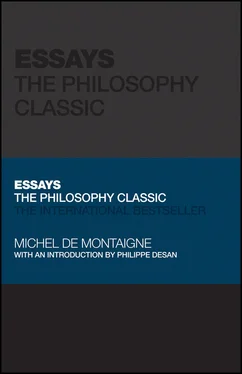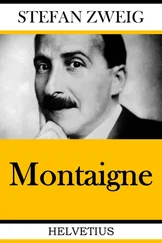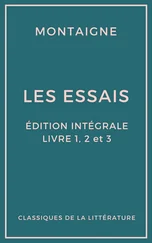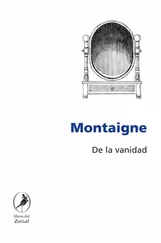Michel de Montaigne - Essays
Здесь есть возможность читать онлайн «Michel de Montaigne - Essays» — ознакомительный отрывок электронной книги совершенно бесплатно, а после прочтения отрывка купить полную версию. В некоторых случаях можно слушать аудио, скачать через торрент в формате fb2 и присутствует краткое содержание. Жанр: unrecognised, на английском языке. Описание произведения, (предисловие) а так же отзывы посетителей доступны на портале библиотеки ЛибКат.
- Название:Essays
- Автор:
- Жанр:
- Год:неизвестен
- ISBN:нет данных
- Рейтинг книги:3 / 5. Голосов: 1
-
Избранное:Добавить в избранное
- Отзывы:
-
Ваша оценка:
- 60
- 1
- 2
- 3
- 4
- 5
Essays: краткое содержание, описание и аннотация
Предлагаем к чтению аннотацию, описание, краткое содержание или предисловие (зависит от того, что написал сам автор книги «Essays»). Если вы не нашли необходимую информацию о книге — напишите в комментариях, мы постараемся отыскать её.
Essays: The Philosophy Classic
Essays: The Philosophy Classic
Essays — читать онлайн ознакомительный отрывок
Ниже представлен текст книги, разбитый по страницам. Система сохранения места последней прочитанной страницы, позволяет с удобством читать онлайн бесплатно книгу «Essays», без необходимости каждый раз заново искать на чём Вы остановились. Поставьте закладку, и сможете в любой момент перейти на страницу, на которой закончили чтение.
Интервал:
Закладка:
“And there never were, in the world, two opinions alike, no more than two hairs, or two grains: their most universal quality is diversity” ( Book II, Chapter 37).
For Montaigne, variety is the driving principle of humanity and its history. From the books of the ancients to the worldview of cannibals in the New World, we see the complexity of human thought and practice.
 Essays, 1588 edition
Essays, 1588 edition
MY WORLD, NOT THE WORLD
Montaigne makes the conscious decision to describe the world in its multifaceted representations rather than seek to show some prescriptive overlying order. The world is always his world, nothing more. Judgment cannot be generalized or imposed on others. For this reason, civilizations must be understood on their own terms and should not be judged according to their “advancements” in relation to other civilizations. On this point, Montaigne is very critical of the conquest of the New World and its accompanying moral discourse. He prefers to imagine himself on the other side of what he observes, so that he can understand fully what it feels like and means to be different.
The more he looks at customs around the world, the more he doubts that humans can be generalized into a single essence. He excels at describing his own existence (with its particular experiences) in relation to other existences and develops his method of distingo : understanding oneself first, one can begin to understand others. This interactionist principle of human existence defines Montaigne's writing – and it is an approach we should take seriously, today more than ever.
Starting from a materialist perspective (the existential conditions observable throughout the world and universe), Montaigne realizes that the body is the foundation for all knowledge, and that the mind itself is inseparable from the body:
“Is it not a ridiculous attempt for us to forge for those to whom, by our own confession, our knowledge is not able to attain, another body, and to lend a false form of our own invention; as is manifest in this motion of the planets; to which, seeing our wits cannot possibly arrive, nor conceive their natural conduct, we lend them material, heavy, and substantial springs of our own by which to move…” ( Book II, Chapter 12).
Human experience has limits, which is where the mind comes in. In this crucial moment – one that defines “modernity” – knowledge thus depends on both the experiences of the body and the conceptualizations of the mind. They cannot be separated. However, epistemologically, this harmony between what Descartes will call “common sense” (reason) and the senses does not last long. In the seventeenth century they are separated to create modern philosophy, which in its abstractions relegates the senses and the body to “noise”.
MONTAIGNE THE PHILOSOPHER
For Montaigne, reason and imagination are both equal in terms of producing new knowledge. Like the oscillations of the world and the universe, “the body and soul are in perpetual moving and action” (II, 37). This perpetual motion defines life itself. Montaigne's philosophy is movement since there can be no knowledge outside the human body. We could argue that Montaigne is a wanderer of writing: “my style and my wit wander at the same rate” (III, 9). The wandering body never allows itself to be imprisoned in common places; it constantly flees forward. Montaigne is always elsewhere; we rarely find him where he tells us he is going. From this understanding, all knowledge becomes relative insofar as it depends on bodily experiences that will sometimes adapt to the mind, and at other times dominate the mind.
Montaigne acknowledges that the mind and the body often assert their monstrosity in remarkable ways (the religious wars of his time, for example), but this is an evil that he deems worthy of consideration and reflection. Theory and action are for him inseparable. As he puts it, “my fancy does not go by itself, as when my legs move it” (III, 3). All ideas require action. The mind may explore the world in all its shapes and forms, but personal experiences validate the ideas that we form. This journey through the meanders of thought – a thought which can only be understood in its relation to different thoughts – leads Montaigne into an analysis of himself, a process we call introspection. While he lays himself open to the many contradictions of his experience, he chooses not to suppress them from his book.
Introspection and reflections about the self only work because Montaigne establishes “commerces” with others, principally his friend who passed away (Étienne de la Boétie), notable women in his circle such as Diane de Foix, and books (ancient philosophers, whom he copiously references and quotes). And yet, Montaigne would not really become the Montaigne we know and appreciate today, i.e. the observer of cultural differences and the founder of anthropology (a discipline that is not prescriptive, but simply tries to describe human variation), until he finally accepted (after 1585) to content himself with “reporting” human behaviors in all their contradictions – rather than looking for a common denominator in them.
“Others form man; I only report him: and represent a particular one, ill fashioned enough, and whom, if I had to model him anew, I should certainly make something else than what he is but that's past recalling” (III, 2).
Montaigne would soon abandon any attempt to find the “human condition” (his term), and therefore a possible unity or an essence of the human race, in order to concentrate on a descriptive anthropology. Descartes is often presented as the architect of modern philosophy (creating a blueprint of human essence). Montaigne remains an endless surveyor, observer and describer of human customs and mores.
MONTAIGNE THE SOCIAL THINKER
No grand theory, no system is present in the Essays . Over the centuries, critics have generally refused to consider Montaigne a social thinker; he's been pictured as a literary man and “accidental” philosopher, withdrawn in his tower, playing with his cat. And yet, although there is no project of a better society in the Essays , it is possible to identify several constitutive elements of a sociology and an anthropology that we could group under the heading of “social discourse” (one that is often critical of the social organization of his time) in Montaigne's often contradictory statements. This social discourse is manifested in his own political actions as a mayor of Bordeaux and governor of Guyenne. Indeed, Montaigne's two terms as mayor of Bordeaux from 1581 to 1585 allow us to form a more precise idea of his social commitments and his participation in the political debate of his time.
Let us give two examples. Re-elected with difficulty as mayor in 1583, Montaigne turned against the Parlement (his former employer) and denounced abuses such as tax evasion by those who enriched themselves on the backs of the poor. Too many judicial officers were exempt from taxes, and too many relatives of presidents and councilors were declared “noble” and therefore not subject to taxation. In a book of grievances ( cahier de doléances ) addressed to the king, Montaigne and six members of the Jurade (city council) complained about the fact that “the richest and opulent families of the said city would have been exempt” from these taxes “for the privilege claimed by all the officers of justice and their widowers”. Thus, in the year 1583, Montaigne spoke firmly regarding social justice and openly criticized the ennoblement of members of Parlement and their families. He spoke as a noble himself and seems to have forgotten his own' family's rise in society. The author of the Essays reminded Henry III that the king's justice must be administered free of charge (court actions were expensive) and “to the smallest crowd of the people as possible”. He also endorsed the following statement: “all levies might be imposed equally on everyone, the strong carrying the poor, and suggest that it is very reasonable that those who have greater resources feel the burden more than those who survive only by chance and the sweat of their brows”.
Читать дальшеИнтервал:
Закладка:
Похожие книги на «Essays»
Представляем Вашему вниманию похожие книги на «Essays» списком для выбора. Мы отобрали схожую по названию и смыслу литературу в надежде предоставить читателям больше вариантов отыскать новые, интересные, ещё непрочитанные произведения.
Обсуждение, отзывы о книге «Essays» и просто собственные мнения читателей. Оставьте ваши комментарии, напишите, что Вы думаете о произведении, его смысле или главных героях. Укажите что конкретно понравилось, а что нет, и почему Вы так считаете.












